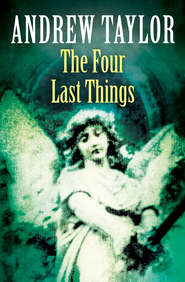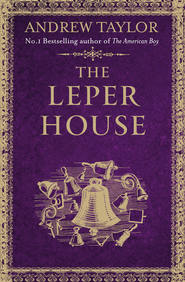По всем вопросам обращайтесь на: info@litportal.ru
(©) 2003-2024.
✖
God’s Fugitive
Настройки чтения
Размер шрифта
Высота строк
Поля
God’s Fugitive
Andrew Taylor
This edition does not include illustrations.A new biography of one of the most intrepid, romantic and fascinating of the great nineteenth-century travellers.Explorer, scholar, travel writer and poet, Charles Doughty was one of the great 19th-century adventurers. In the 1870s he spent two years wandering through Arabia, first with the Haj pilgrimage, then joining nomadic bands of Arabs. Unyielding in his independence of mind, the tall, red-bearded Doughty’s aggressive refusal to conceal his Christianity made his travels all the more dangerous: he was threatened with death several times, spurned, insulted and often beaten by angry mobs.The story of his archaeological investigations and his wide-ranging observations of Arabia and desert life were published in 1888 as the famous Arabia Deserta. Although feted by the literary establishment, Doughty often found himself at odds with the authorities, his work rejected and his genius (as he saw it) neglected. His long, impassioned and often paradoxical life make him one of the great British scholar-eccentrics.
GOD’S FUGITIVE
The Life of Charles Montagu Doughty
Andrew Taylor
DEDICATION (#ulink_91ce7d5f-dd3c-51a9-8db5-244e03a06bd6)
Looking in one direction,
this book is dedicated to
HARRY TAYLOR
and in the other
to
SAM, ABIGAIL AND REBECCA
EPIGRAPH (#ulink_1e3eebfb-b78b-5e50-a12e-50b85ddfe826)
The traveller must be himself in men’s eyes, a man worthy to live under the bent of God’s heaven, and were it without a religion; he is such who has a clean human heart and longsuffering under his bare shirt: it is enough, and though the way be full of harms, he may travel to the ends of the world.
Travels in Arabia Deserta, i, p. 56
CONTENTS
Cover (#udb631a4e-3e11-52a3-90d6-5ef3da8868cc)
Title Page (#u1a07a34b-1ac5-5d1c-ba48-b3b3e2971853)
Dedication (#ue342f9a1-1990-5670-90b6-13592ecb9839)
Epigraph (#u27274280-3848-56a4-ba83-f89629baab53)
Foreword (#u51ba865c-2ad9-557b-8ef3-16b5e4ff832d)
Map (#uf64263a8-3424-5b07-b612-4db8813e16b7)
Chapter One (#u14f0598c-b73f-580f-84e5-28580b57b418)
Chapter Two (#ua3c5ce91-8dcf-55e1-b11b-f340d68b61ae)
Chapter Three (#u8d611c69-3105-5a79-bd3c-381542813aa1)
Chapter Four (#litres_trial_promo)
Chapter Five (#litres_trial_promo)
Chapter Six (#litres_trial_promo)
Chapter Seven (#litres_trial_promo)
Chapter Eight (#litres_trial_promo)
Chapter Nine (#litres_trial_promo)
Afterword (#litres_trial_promo)
Keep Reading (#litres_trial_promo)
Bibliography (#litres_trial_promo)
Index (#litres_trial_promo)
Acknowledgements (#litres_trial_promo)
About the Author (#litres_trial_promo)
Notes (#litres_trial_promo)
Author’s Note (#litres_trial_promo)
Praise (#litres_trial_promo)
Also by the Author (#litres_trial_promo)
Copyright (#litres_trial_promo)
About the Publisher (#litres_trial_promo)
FOREWORD (#ulink_68f7fe59-b37f-5bdc-9a91-019a178c82f7)
Charles Montagu Doughty was the foremost Arabian explorer of his or any other age. His two years of wandering with the bedu through the oasis towns and deserts started a tradition of British exploration and discovery by travellers who acknowledged him as their master, and he returned to England to write one of the greatest and most original travel books.
He was that unlikely adventurer for his day, a man who would not kill – and yet he had strength and passion, and could face the threat of his own death without flinching. As a writer, he believed in his writing and in his vision when nobody else did; turning his back on exploration, he dedicated his life to poetry and struggled singlehandedly to change the direction of English literature. He lived through the greatest revolution in thought the world had ever seen, and spent a lifetime wrestling with his conscience over its consequences.
Among his admirers as an artist were George Bernard Shaw, who found Arabia Deserta inexhaustible. ‘You can open it and dip into it anywhere all the rest of your life,’ he declared.
(#litres_trial_promo) There were F. R. Leavis, Edwin Muir, Wyndham Lewis and, most ardent of all, T. E. Lawrence. Seven Pillars of Wisdom is, in its way, Lawrence’s own homage to Doughty.
And now he is virtually forgotten, his dense and idiosyncratic works valued by antiquarian booksellers and lovers of Arabia, but practically unknown to the readers of a simpler, less painstaking age. The achievement of his travels on foot and by camel seems overshadowed in the days of four-wheel-drive vehicles, helicopters, satellite navigation systems, supply-drops and commercial sponsorship. The great desert journeys are now all in the past. The tradition of Arabian exploration can never be recovered: it is as much a part of history today as the crossing of the Atlantic, or the search for the source of the Nile.
It was Wilfred Thesiger, another great Arabian explorer, who observed that there could never again be a camel-crossing of the desert like his own in the 1940s, or those of the explorers who went before him. ‘I was the last of the Arabian explorers, because afterwards, there were the cars,’ he said. ‘When I made my journeys in Arabia, there was no possibility of travelling in any other way than the way I went. If you could go in a car, it would turn the whole journey into a stunt.’
Andrew Taylor
This edition does not include illustrations.A new biography of one of the most intrepid, romantic and fascinating of the great nineteenth-century travellers.Explorer, scholar, travel writer and poet, Charles Doughty was one of the great 19th-century adventurers. In the 1870s he spent two years wandering through Arabia, first with the Haj pilgrimage, then joining nomadic bands of Arabs. Unyielding in his independence of mind, the tall, red-bearded Doughty’s aggressive refusal to conceal his Christianity made his travels all the more dangerous: he was threatened with death several times, spurned, insulted and often beaten by angry mobs.The story of his archaeological investigations and his wide-ranging observations of Arabia and desert life were published in 1888 as the famous Arabia Deserta. Although feted by the literary establishment, Doughty often found himself at odds with the authorities, his work rejected and his genius (as he saw it) neglected. His long, impassioned and often paradoxical life make him one of the great British scholar-eccentrics.
GOD’S FUGITIVE
The Life of Charles Montagu Doughty
Andrew Taylor
DEDICATION (#ulink_91ce7d5f-dd3c-51a9-8db5-244e03a06bd6)
Looking in one direction,
this book is dedicated to
HARRY TAYLOR
and in the other
to
SAM, ABIGAIL AND REBECCA
EPIGRAPH (#ulink_1e3eebfb-b78b-5e50-a12e-50b85ddfe826)
The traveller must be himself in men’s eyes, a man worthy to live under the bent of God’s heaven, and were it without a religion; he is such who has a clean human heart and longsuffering under his bare shirt: it is enough, and though the way be full of harms, he may travel to the ends of the world.
Travels in Arabia Deserta, i, p. 56
CONTENTS
Cover (#udb631a4e-3e11-52a3-90d6-5ef3da8868cc)
Title Page (#u1a07a34b-1ac5-5d1c-ba48-b3b3e2971853)
Dedication (#ue342f9a1-1990-5670-90b6-13592ecb9839)
Epigraph (#u27274280-3848-56a4-ba83-f89629baab53)
Foreword (#u51ba865c-2ad9-557b-8ef3-16b5e4ff832d)
Map (#uf64263a8-3424-5b07-b612-4db8813e16b7)
Chapter One (#u14f0598c-b73f-580f-84e5-28580b57b418)
Chapter Two (#ua3c5ce91-8dcf-55e1-b11b-f340d68b61ae)
Chapter Three (#u8d611c69-3105-5a79-bd3c-381542813aa1)
Chapter Four (#litres_trial_promo)
Chapter Five (#litres_trial_promo)
Chapter Six (#litres_trial_promo)
Chapter Seven (#litres_trial_promo)
Chapter Eight (#litres_trial_promo)
Chapter Nine (#litres_trial_promo)
Afterword (#litres_trial_promo)
Keep Reading (#litres_trial_promo)
Bibliography (#litres_trial_promo)
Index (#litres_trial_promo)
Acknowledgements (#litres_trial_promo)
About the Author (#litres_trial_promo)
Notes (#litres_trial_promo)
Author’s Note (#litres_trial_promo)
Praise (#litres_trial_promo)
Also by the Author (#litres_trial_promo)
Copyright (#litres_trial_promo)
About the Publisher (#litres_trial_promo)
FOREWORD (#ulink_68f7fe59-b37f-5bdc-9a91-019a178c82f7)
Charles Montagu Doughty was the foremost Arabian explorer of his or any other age. His two years of wandering with the bedu through the oasis towns and deserts started a tradition of British exploration and discovery by travellers who acknowledged him as their master, and he returned to England to write one of the greatest and most original travel books.
He was that unlikely adventurer for his day, a man who would not kill – and yet he had strength and passion, and could face the threat of his own death without flinching. As a writer, he believed in his writing and in his vision when nobody else did; turning his back on exploration, he dedicated his life to poetry and struggled singlehandedly to change the direction of English literature. He lived through the greatest revolution in thought the world had ever seen, and spent a lifetime wrestling with his conscience over its consequences.
Among his admirers as an artist were George Bernard Shaw, who found Arabia Deserta inexhaustible. ‘You can open it and dip into it anywhere all the rest of your life,’ he declared.
(#litres_trial_promo) There were F. R. Leavis, Edwin Muir, Wyndham Lewis and, most ardent of all, T. E. Lawrence. Seven Pillars of Wisdom is, in its way, Lawrence’s own homage to Doughty.
And now he is virtually forgotten, his dense and idiosyncratic works valued by antiquarian booksellers and lovers of Arabia, but practically unknown to the readers of a simpler, less painstaking age. The achievement of his travels on foot and by camel seems overshadowed in the days of four-wheel-drive vehicles, helicopters, satellite navigation systems, supply-drops and commercial sponsorship. The great desert journeys are now all in the past. The tradition of Arabian exploration can never be recovered: it is as much a part of history today as the crossing of the Atlantic, or the search for the source of the Nile.
It was Wilfred Thesiger, another great Arabian explorer, who observed that there could never again be a camel-crossing of the desert like his own in the 1940s, or those of the explorers who went before him. ‘I was the last of the Arabian explorers, because afterwards, there were the cars,’ he said. ‘When I made my journeys in Arabia, there was no possibility of travelling in any other way than the way I went. If you could go in a car, it would turn the whole journey into a stunt.’











